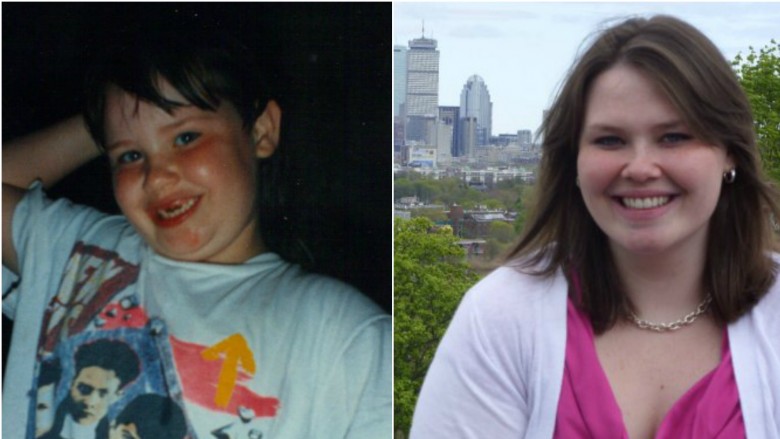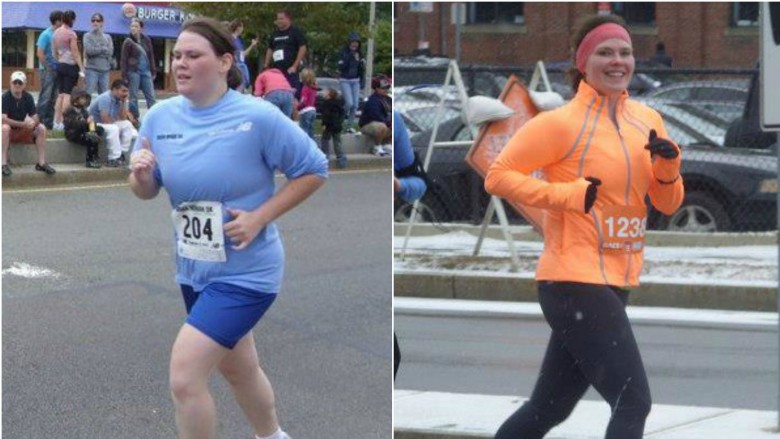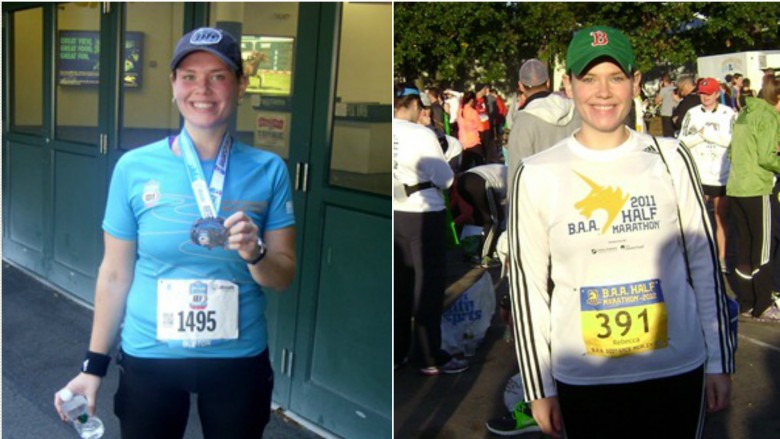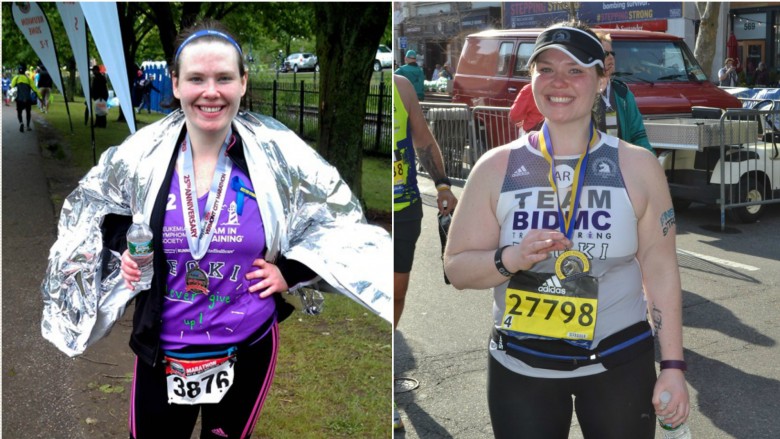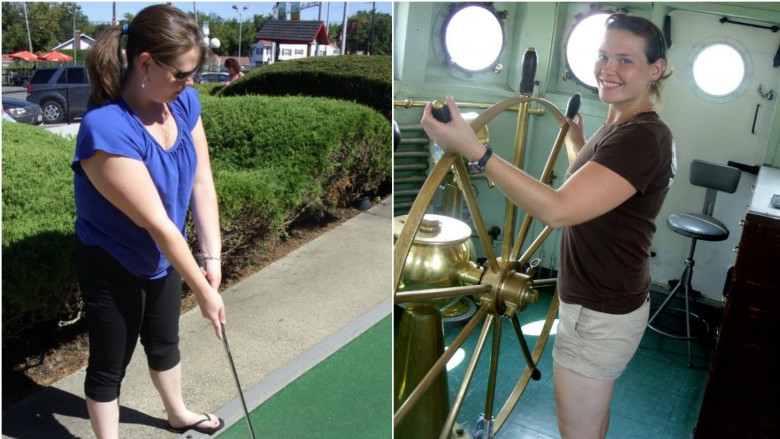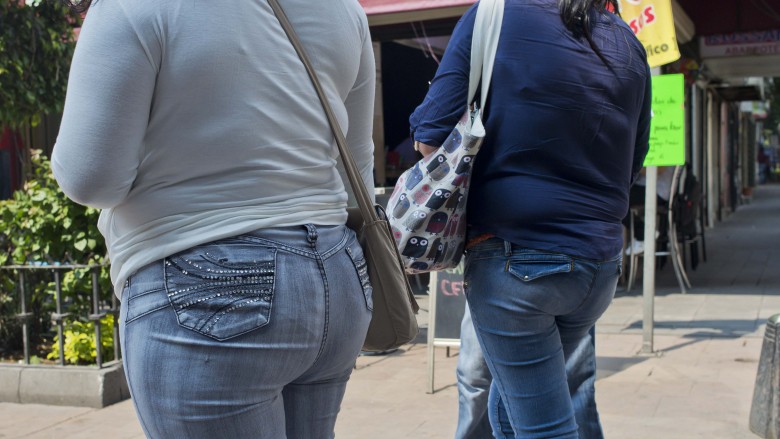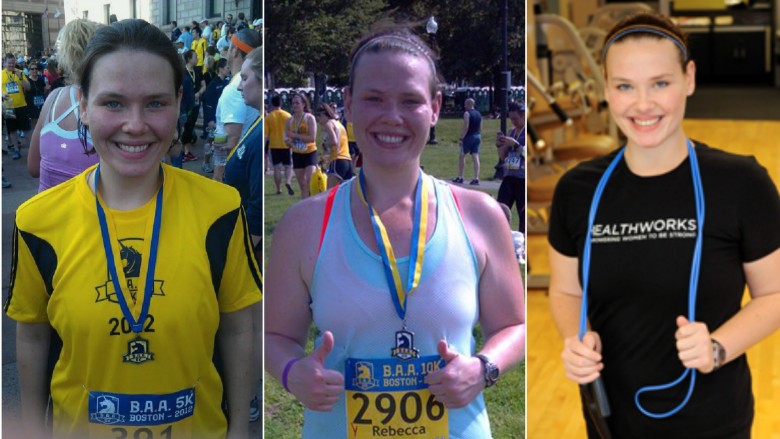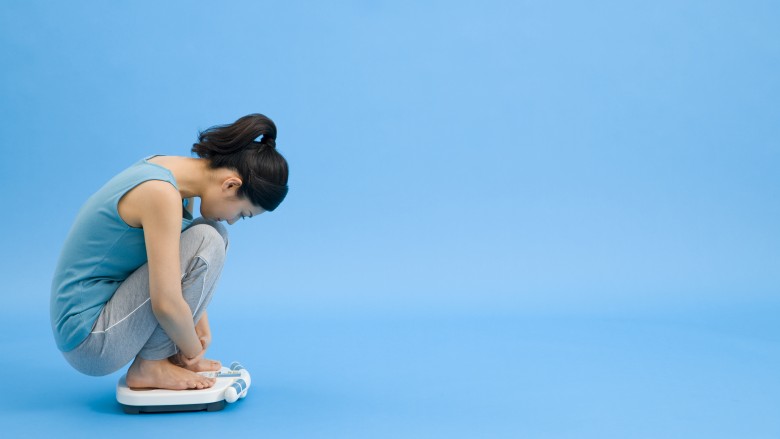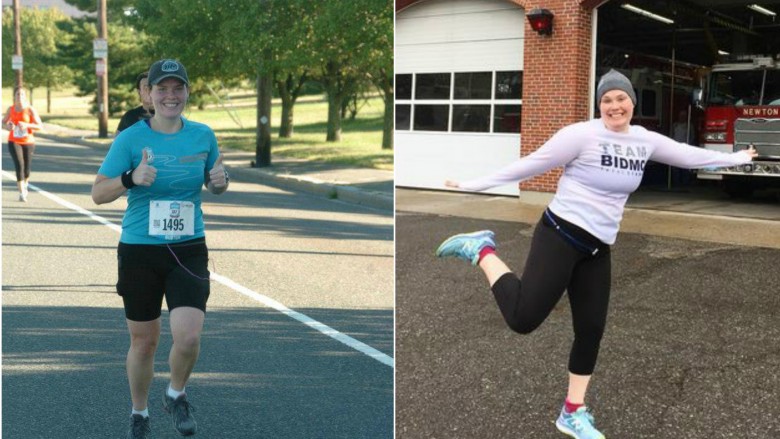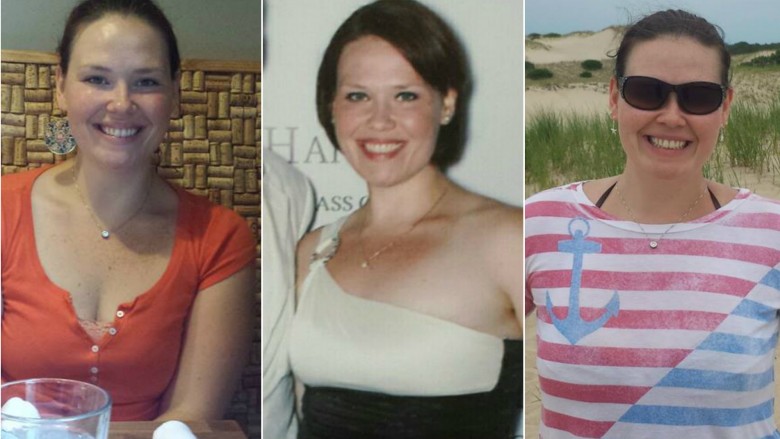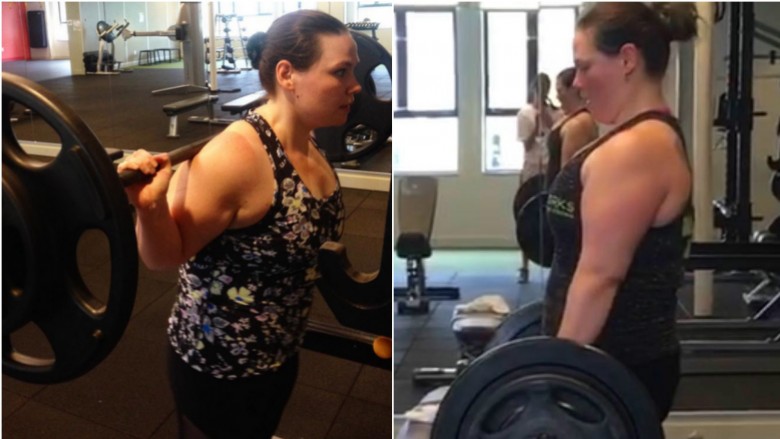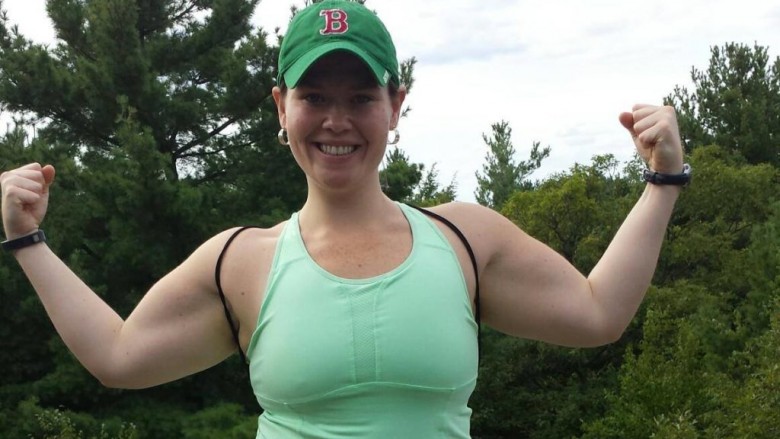What I Learned From Losing 90 Pounds And Regaining 40
If you've ever tried, either successfully or unsuccessfully, to lose weight, you may have placed your entire self worth on whether or not you succeeded at the endeavor. If you lost weight, you may have felt incredibly proud of yourself (rightly so), but you may have also felt like you were valuable for the first time. So what happens if you regain the weight you lost? After all, it's pretty common.
One study found that over a single year, 33.5 percent of people who had lost weight regained more than five percent of the weight they had lost. Having gone through the process of losing a lot of weight myself and then regaining a portion of that weight, it can be hard to disentangle your self worth from the number on the scale. Here's what I learned from losing 90 pounds and regaining 40.
Struggling to lose weight isn't easy on the body or the mind
Let's dispel any assumptions you might have that losing 90 pounds was easy. I was overweight my entire life and when I lost 90 pounds, it certainly was not the first time I had tried to lose weight. As a kid I played sports. From softball to basketball, and finally the swim team, I was moving regularly, except during the off-season. Sports, for me, weren't about exercise. I enjoyed sports, but didn't exercise at all if I wasn't practicing for a game or preparing for a swim meet.
I hated gym class at school and couldn't successfully run a mile. Because I was relatively active most of the year while playing sports, I was pretty healthy despite being overweight. Still, I wanted to lose weight. I ended up becoming a serial dieter and, eventually, developing an eating disorder. When I would lose weight thanks to purging, I would get compliments on my weight loss. This created an unhealthy cycle that was only broken when I got mono. A lightbulb went off during that time and I stopped purging. Unfortunately, I continued overeating.
Once it clicks, it gets easier
Although I wasn't playing any sports in college, I continued eating like I always had. Now, instead of having sports to somewhat regulate my weight, I was sedentary and gained a lot of weight. At my heaviest weight, after graduating college, I was nearly 250 pounds. It wasn't until I joined a community softball league and found that the sport I had always loved — and been pretty good at — was now very difficult because of my weight. That's when it clicked for me. Weight loss wasn't about looking a certain way — I needed to lose weight to continue doing the things I loved.
That night I bought a pair of running shoes, shorts, and a tank top off Ebay. When they arrived, I went for my first run. After that, I continued running. It became a competition with myself to do better on each run. That was helpful because it made it more familiar, like playing a sport. After the exercise clicked, the nutrition wasn't far behind. I preferred running in the evening, but had a hard time doing that if I had eaten a ton during the day. I also found that I couldn't eat heavy meals after running. This led to a dramatic change in my eating habits, almost naturally. I started treating food like fuel for my runs. Even though I wasn't tracking my calories or macronutrients, I started losing weight. Then I signed up for my first race and running did become a sport for me. Everything had clicked and I didn't have to try to lose weight, I was just losing weight.
I felt physically better
The more weight I lost, the better I felt physically. I wasn't getting sick as often with things like colds. I also started having fewer headaches, something I had struggled with since I was young. At the time I started losing weight, I worked at the top of a ridiculous hill. Walking up the hill every day had been the bane of my existence. Once I started losing weight, the hill felt like no big deal. I also realized I didn't have as many general aches and pains. Suddenly the benefits of losing weight were very apparent to me.
I could do more
Not only did I feel better after losing weight, but I could also do more. I'll never forget the first time I got on a plane and felt comfortable in the seat. I had avoided using the airplane restroom on previous flights because the space was so cramped, but on that same flight where I felt comfortable in the seat, I used the airplane restroom and found that I could easily move around. It didn't stop there. The more weight I lost, the better I became at running. With less weight to carry, I became faster. I also found that losing weight meant I could wear high heels for a lot longer without killing my feet.
One of the biggest changes after losing weight was how much more energy I had. This meant that not only could I physically do more because of my smaller size, but I also wanted to do more. At the time I volunteered as a Big Sister and I loved that I had the energy to do physical things with her, like skateboarding or Wii boxing. I also started hiking again, something I always loved doing, but hadn't done as much because I was self-conscious of my size and ability to get around.
I felt better about myself
Not only did I feel better physically after losing weight, I felt better about myself. I had more self-confidence and found myself holding my head just a little bit higher. At the time, I attributed this to weighing less — after all it seemed like the logical conclusion. What I realize now is that what made me feel so confident was the fact that I had tackled a goal head on and I accomplished it. I felt empowered that after so many years of feeling like I couldn't lose weight, I had.
This confidence led me to sign up for my first half marathon, then a second, and a third. After that, it led me to sign up for a full marathon, then a second, and finally the Boston Marathon. The reason I know it wasn't just the pounds that I shed that made me more confident is that my confidence stuck around after I started regaining weight. It wasn't about the fact that 90 pounds were gone, it was that I had done what was necessary to get rid of them. That's what made me feel better about myself and that is what has allowed me to become a three-time marathoner.
People treated me differently
One of the reasons it's so easy to get caught up in thinking your value as a person changes when you lose weight is because other people treat you differently. The feedback I got from society was that I AM better now that I lost weight. People treated me like my opinions mattered more. Being treated differently by strangers after I lost weight wasn't very surprising to me, but being treated differently by people who had known me for years was a huge surprise. Just as surprising is how people have, once again, started treating me differently after regaining some of the weight I lost.
I treated people differently
An even bigger surprise than people treating me differently after I lost weight was how I started to treat other people differently. My expectations for others became very unfair. I started to fall into the habit of judging other people I saw on the street. I would get frustrated when I was walking behind a bigger person who was walking slowly, or I would judge someone for taking the bus just two stops. This was the scariest part of losing weight.
Being overweight my entire life had meant that I was part of a somewhat marginalized group. By losing weight, I suddenly had more privilege and I quickly started to marginalize the "other" people. I had to work very hard to remind myself that I have no idea what other people are going through. Although I had lost 90 pounds, I still wasn't stick thin and people probably still judged me if they saw me walking around with an ice cream in my hand.
I had to remind myself that the person who took the bus two stops might have another physical condition that prevents them from walking long distances. The overweight person I see eating McDonald's might be having a treat after months of strict clean eating. Even if neither of those were true, even if that person taking the bus just two stops didn't feel like walking, and even if the other person eating McDonald's eats it every day, I also had to realize that it's absolutely none of my business.
Just as how what I eat and how I behave isn't any of their business. I have no room to judge anyone for the choices they make. It was a hard realization to come to, but once I did, it not only made me a better person, it made me a better personal trainer for my clients. I could meet them where they were rather than expecting them to begin their journey at my unrealistic expectations.
I wanted to help other people feel better
Because I felt better about myself after losing weight, I wanted to help other people lose weight. I decided to get a personal training certification and work full-time in the fitness industry. It felt like weight loss was what I knew, so that was initially my specialty. Women wanted to lose weight and I was their girl!
What I realized very quickly was that different strategies work for different people, and not everyone has the same goal. Just because running was what clicked for me didn't mean that it would be a viable approach for my clients. I had no problem eating the same food every single day, but some of them couldn't, or wouldn't, do that. What it finally came down to, and the way I found success with many of my clients, was exploring why they wanted to lose weight. That had been the defining moment in my own journey, so I don't know why it took me so long to realize it might be the defining moment for others. I realized that to be successful losing weight, you have to do it for yourself, not for anyone else or their expectations.
More than that, I also realized that losing weight isn't always the most important thing. Even if someone is overweight, they may not need or want to lose weight. I had several personal training clients who didn't drop an ounce the whole time we were working together, but who gained flexibility, strength, and endurance and who told me they felt the best they ever had. My focus shifted from wanting to help other people lose weight to just wanting to help other people feel better.
Maintaining weight loss is harder than losing weight
This is probably a controversial thing to say, but think about it. How many people do you know who have lost weight (whether five pounds, ten pounds, or 20 pounds) only to gain it back? Sure, sometimes this is because the method was unsustainable or a fad diet, but even when you lose weight the "right" way, it can be really difficult to keep it off. This is why it's so important not to let your self-worth be tied to the number on the scale.
When we lose weight, there are a few different spots where our bodies could end up. My lowest weight ever was 150 pounds (and that lasted for about a day, I think). At the time I thought I still needed to lose more weight. Looking back at photos, my body wasn't happy at that weight. I had lost a lot of fat, but I had also lost muscle. When I stopped doing as much cardio and started lifting, I gained weight but I also gained strength. My ideal weight was probably somewhere around 165 pounds, not because of what the scale said, but because of my muscle to fat ratio at that time. While gaining from 150-165 was initially a good thing, it was difficult to know how to maintain that weight. Up until that point, all I had known, really, was how to lose weight and how to gain weight. Maintaining was a whole different ball game. Because of that, I continued to gain weight.
What worked once might not work again
Once I realized that I had gained more weight than I had wanted, I tried to go back to my original approach to losing. I started running more and eating less. The only problem was, it didn't work the same way this time. There are a lot of reasons for this, among them was that I was much more physically fit this time around.
The first time I started running, I went from doing absolutely nothing to running about a mile a day (if not more). This kickstarted my metabolism into overdrive and helped me lose weight quickly. This time, even though I hadn't been running regularly, I had been working out regularly. That meant that running wasn't doing much to help me lose weight and I needed to focus on nutrition. The problem with that was that the goals I had for myself physically (namely, powerlifting) required a certain amount of food to increase strength. I had to make a decision about what was more important to me now: the number on the scale or my weightlifting performance.
I felt like a fraud
As I was gaining weight while working in fitness, I felt like a fraud. I was so caught up in the number on the scale and my clients' constant goals of losing weight that I forgot there are other ways to measure fitness. Despite a growing interest in boxing and powerlifting that had absolutely nothing to do with losing weight, I decided to step back from working in fitness full time.
Society has taught us that if you are fit, you must look a certain way, and I bought into that despite being a highly qualified personal trainer. I had gained weight, but I was active and fit. I let the nagging voices get to me and I gave up what I loved. I'm still a certified personal trainer with one-on-one home clients, but I haven't worked in a gym in almost two years because I let society tell me what I should look like.
Weight doesn't define health or beauty
Today I weigh more than my lowest adult weight, but less than my highest adult weight. I carry more weight around my middle than I would like, but my desire to lose it is mostly because I know that visceral fat is the most unhealthy kind of fat and losing it would be healthier for me. Still, my weight does not define me or my fitness. Today I can lift almost three times the amount of weight that I could lift at my lowest adult weight. I may have gained weight, but I have also gained strength. I may have a higher BMI than in 2012, but my body is healthy. Somewhere along the way, we confused skinny with physically fit. You do not have to be skinny to be fit and healthy.
One of my biggest inspirations for continuing to improve my fitness no matter my size is Jessamyn Stanley. If you haven't heard of her, look her up. She's a body-positive advocate and yoga teacher that showed me that being healthy and physically fit can happen at any size. What I love most about her is that she is not skinny, but she still cares about living healthy.
Things that changed when I lost weight the right way still hold true
One of the most important things I learned from losing 90 pounds and then regaining 40 is that most of the benefits I got from losing weight didn't go away when I regained weight. Losing weight made me feel empowered, which gave me the confidence to stand up for myself a lot more. That didn't go anywhere after I regained weight. Losing weight made me a better athlete and today I am stronger and fitter than I have ever been. Would I like to lose a few pounds to get back to that sweet spot of muscle-to fat-ration? I would be lying if I said I didn't, but at this point that would just be icing on the cake. A very strong, deadlifting cake.
If you really want to lose weight, you can
Barring medical issues, I'm living proof that if you want to lose weight, you can. Now, you may say that you've tried and tried and that you really want to lose weight, but you've never been able to. As someone who has lived that, and in some ways is still living it, I'm calling you out. How much do you really want to lose weight and why do you want to lose weight? I was finally able to lose 90 pounds because I found the reason that was important to me.
I couldn't lose weight for anyone else, or just for the sake of being skinnier. I wanted to lose weight so I could do the things I loved. If you really want to lose weight, you can. If you don't have a reason that drives you — if you don't want to lose weight more than just about anything, you won't. And that's actually okay. Maybe weight loss isn't your goal. Remember that losing weight is just one way to be healthier. If you want to lose weight, you can, but you don't have to. Your worth is not attached to a number on the scale.


